A short post to show the usefulness of Hunchentoot-errors and to thank Mariano again.
This library adds the current request and session data to your stacktrace, either in the REPL (base case) or in the browser.
TLDR;
Use it like this:
;; (ql:quickload "hunchentoot-errors)
;;
;; We also use easy-routes: (ql:quickload "easy-routes")
(defclass acceptor (easy-routes:easy-routes-acceptor hunchentoot-errors:errors-acceptor)
()
(:documentation "Our Hunchentoot acceptor that uses easy-routes and hunchentoot-errors, for easier route definition and enhanced stacktraces with request and session data."))
then (make-instance 'acceptor :port 4242).
Base case
Imagine you have a bug in your route:
(easy-routes:defroute route-card-page ("/card/:slug" :method :GET :decorators ((@check-roles admin-role)))
(&get debug)
(error "oh no"))
When you access localhost:4242/card/100-common-lisp-recipes, you will see this in the REPL:
[2023-10-13 16:48:21 [ERROR]] oh no
Backtrace for: #<SB-THREAD:THREAD "hunchentoot-worker-127.0.0.1:53896" RUNNING {10019A21A3}>
0: (TRIVIAL-BACKTRACE:PRINT-BACKTRACE-TO-STREAM #<SB-IMPL::CHARACTER-STRING-OSTREAM {1006E9ED43}>)
1: (HUNCHENTOOT::GET-BACKTRACE)
2: ((FLET "H0" :IN HUNCHENTOOT:HANDLE-REQUEST) #<SIMPLE-ERROR "oh no" {1006E9EBE3}>)
3: (SB-KERNEL::%SIGNAL #<SIMPLE-ERROR "oh no" {1006E9EBE3}>)
4: (ERROR "oh no")
5: (MYWEBAPP/WEB::ROUTE-CARD-PAGE "100-common-lisp-recipes")
6: ((:METHOD HUNCHENTOOT:ACCEPTOR-DISPATCH-REQUEST (EASY-ROUTES:EASY-ROUTES-ACCEPTOR T)) #<MYWEBAPP/WEB::ACCEPTOR (host *, port 4242)> #<HUNCHENTOOT:REQUEST {1006C55F33}>) [fast-method]
7: ((:METHOD HUNCHENTOOT:HANDLE-REQUEST (HUNCHENTOOT:ACCEPTOR HUNCHENTOOT:REQUEST)) #<MYWEBAPP/WEB::ACCEPTOR (host *, port 4242)> #<HUNCHENTOOT:REQUEST {1006C55F33}>) [fast-method]
[…]
And, by default, you see a basic error message in the browser:
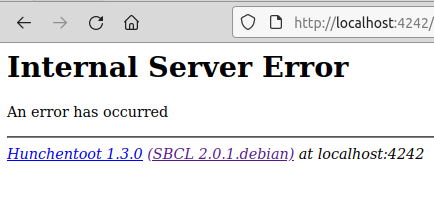
Show errors
Set this:
(setf hunchentoot:*show-lisp-errors-p* t)
Now you can see a backtrace in the browser window, which is of course super useful during development:
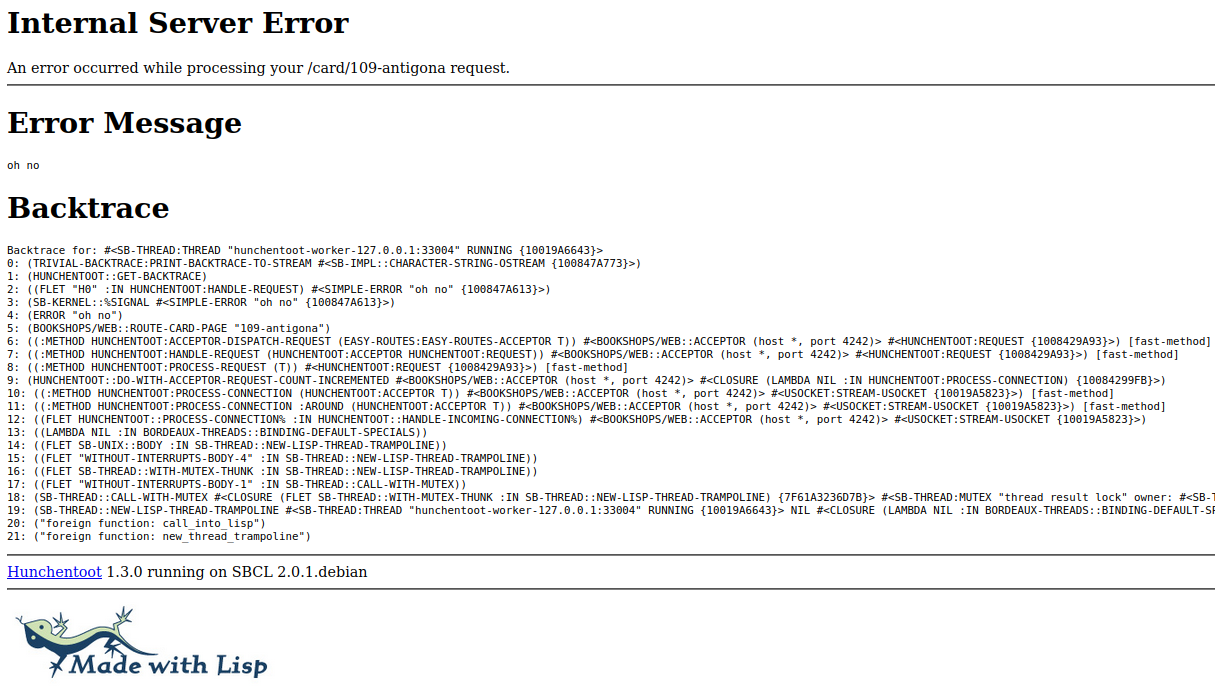
BTW, if you unset this one:
(setf hunchentoot:*show-lisp-backtraces-p* nil) ;; t by default
You will see the error message, but not the backtrace:
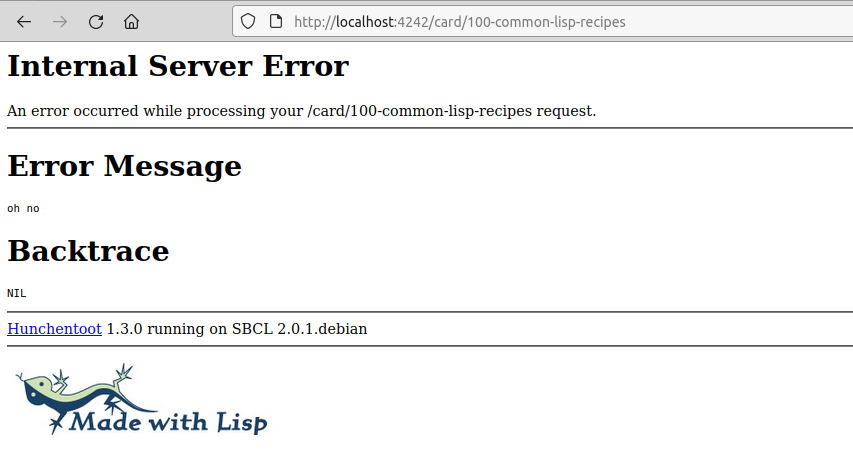
And I remind you that if you set *catch-errors-p* to nil, you’ll get the debugger inside your IDE (Hunchentoot will not catch the errors, and will pass it to you).
Now with request and session data
Now create your server with our new acceptor, inheriting hunchentoot-errors.
You’ll see the current request and session paramaters both in the REPL:
[…]
19: (SB-THREAD::NEW-LISP-THREAD-TRAMPOLINE #<SB-THREAD:THREAD "hunchentoot-worker-127.0.0.1:48756" RUNNING {100AAAFC43}> NIL #<CLOSURE (LAMBDA NIL :IN BORDEAUX-THREADS::BINDING-DEFAULT-SPECIALS) {100AAAFBEB}> NIL)
20: ("foreign function: call_into_lisp")
21: ("foreign function: new_thread_trampoline")
HTTP REQUEST:
uri: /card/100-common-lisp-recipes
method: GET
headers:
HOST: localhost:4242
USER-AGENT: Mozilla/5.0 (X11; Linux x86_64; rv:103.0) Gecko/20100101 Firefox/103.0
ACCEPT: text/html,application/xhtml+xml,application/xml;q=0.9,image/avif,image/webp,*/*;q=0.8
ACCEPT-LANGUAGE: fr,fr-FR;q=0.8,en-US;q=0.5,en;q=0.3
ACCEPT-ENCODING: gzip, deflate, br
DNT: 1
CONNECTION: keep-alive
COOKIE: "..."
UPGRADE-INSECURE-REQUESTS: 1
SEC-FETCH-DEST: document
SEC-FETCH-MODE: navigate
SEC-FETCH-SITE: none
SEC-FETCH-USER: ?1
SESSION:
:USER: #<MYWEBAPP.MODELS:USER {100EA8C753}>
127.0.0.1 - [2023-10-13 17:32:18] "GET /card/100-common-lisp-recipes HTTP/1.1" 500 5203 "-" "Mozilla/5.0 (X11; Linux x86_64; rv:103.0) Gecko/20100101 Firefox/103.0"
and in the browser:
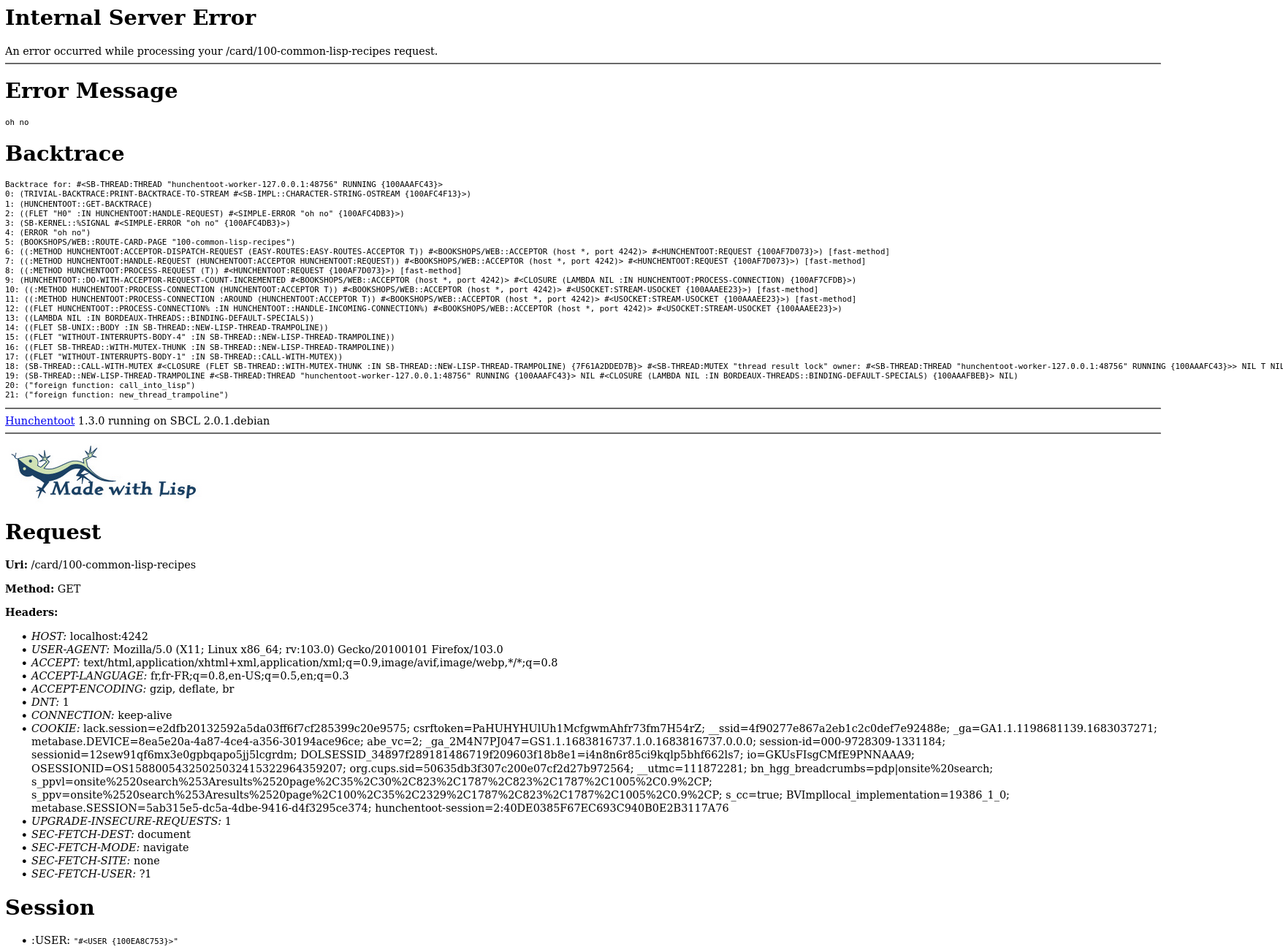
(notice the #<USER {…}> at the bottom? You’ll need a commit from today to see it, instead of # only)
Final words
These Hunchentoot variables were kinda explained on the Cookbook/web.html, I’ll augment that.
Clack users can use the clack-errors midleware.
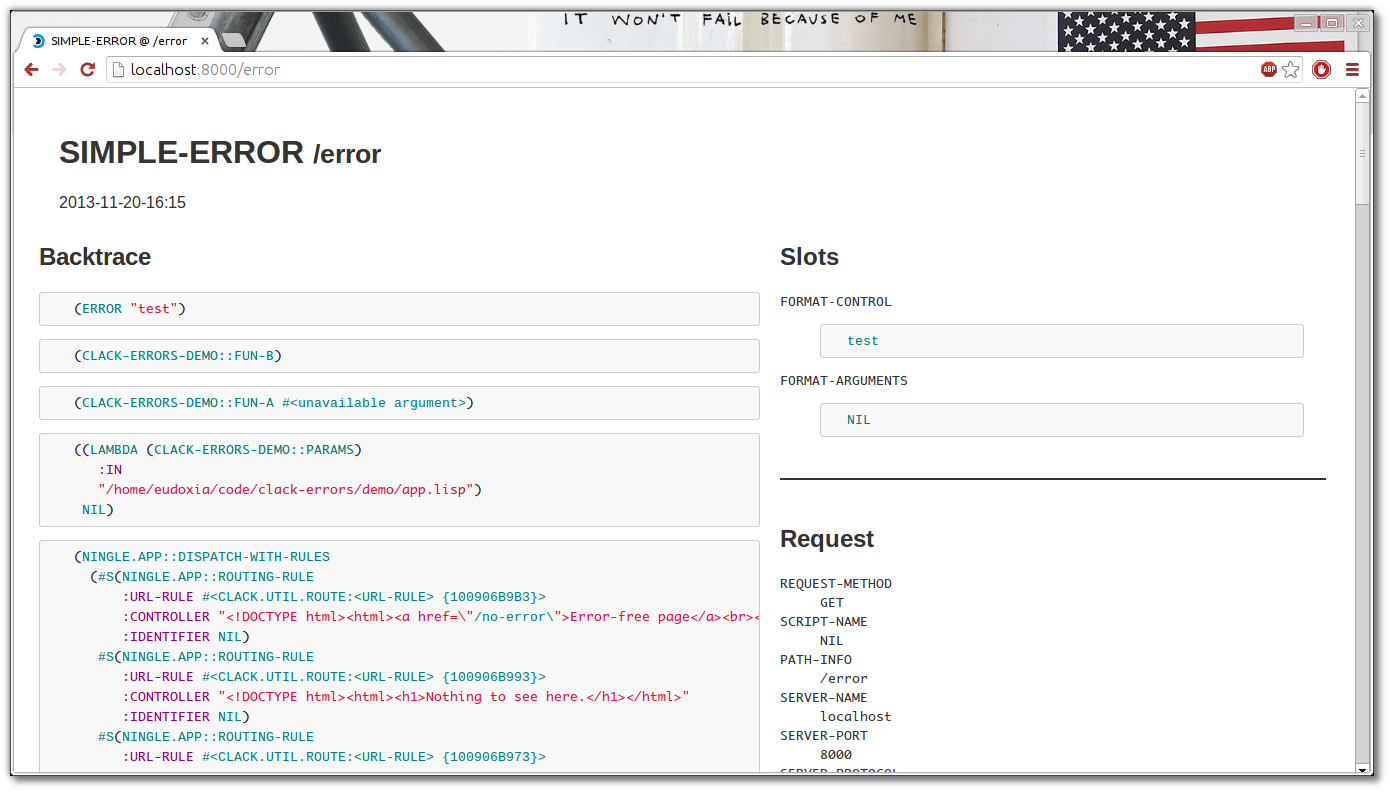
Who wants to send a PR for colourful stacktraces?